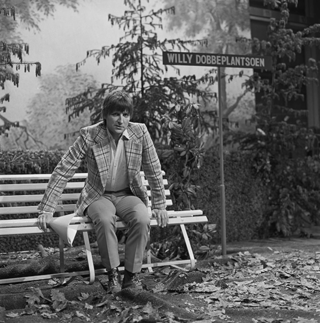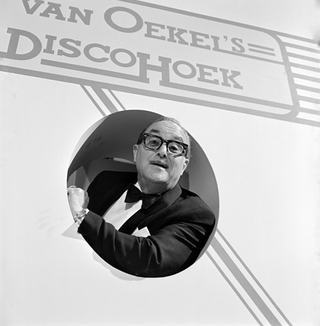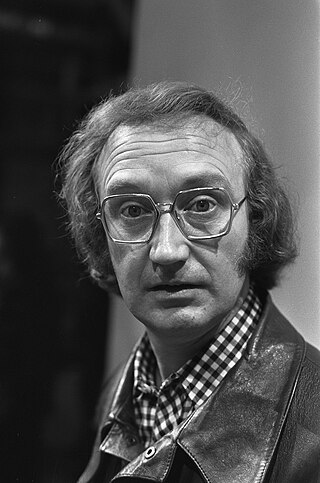
Willem Theodoor "Wim T." Schippers is a Dutch artist, comedian, television director, and voice actor. During the 1960s, he worked mostly as a visual artist, associated with the international Fluxus-movement. As a television writer, director, and actor he is responsible for some of the most notable and controversial shows on Dutch televisions from the 1960s to the 1990s, creating a number of lasting characters and enriching the language with terms and expressions first coined in his shows. In addition, he voiced the characters of Ernie and Kermit the Frog on Sesamstraat, the Dutch version of Sesame Street. For his shows, he has written over three hundred songs, and his reputation has changed from being Dutch television's "enfant terrible" to an acknowledged master in a variety of genres.

Luv' were a Dutch girl group that scored a string of hit records in Continental Europe as well as Israel, South Africa, Rhodesia, Australia, New Zealand, Canada, Argentina and Mexico in the late 1970s and early 1980s. The original members were Patty Brard, José Hoebee and Marga Scheide. In 1979, Luv' was 'Holland's best export act' and thus received the 'Conamus Export Prize'.

U.O.Me is the third single by the Dutch girl group Luv', released in early 1978 by Philips Records. It appears on the 1978 debut album, With Luv' and is considered as Luv's real breakthrough in Benelux. This record is also credited as U.O.Me , U.O.Me or U.O.Me .

Theo van den Boogaard – also known as Theo Bogart – is a Dutch cartoonist. He first came to attention as an underground cartoonist in the early 1970s for the sexually explicit comics series Ans en Hans krijgen de kans. He is best known for co-creating Sjef van Oekel, a long-running comic strip based on the TV character, written by Wim T. Schippers. He received the 1989 Stripschapprijs for his body of work.

Ruud van Hemert was a Dutch film director known especially for (dark) comedy. In the 1970s he helped produce and direct TV shows on VPRO before starting a career as a film director.
Opzoek naar Yolanda was a Dutch dramady television show by Wim T. Schippers, consisting of six episodes aired by the VPRO from October to December 1984. The show was a continuation of sorts of Schippers' De lachende scheerkwast (1981-1982) and featured some of the same characters. In turn, it was a kind of prequel to We zijn weer thuis, which ran from 1989 to 1994.

De lachende scheerkwast is a Dutch television show written and directed by Wim T. Schippers, who also plays one of the lead characters, Jacques Plafond. It ran on VPRO television for six episodes in 1981 before being canceled, and then returned for another six episodes.

Clous van Mechelen is a Dutch musician, arranger, and actor. Van Mechelen scored a minor hit in 1969 with his band The Butlers, and became widely known through the radio and television shows written and directed by Wim T. Schippers, in which he played the character Jan Vos and wrote songs for the various characters.
Ronflonflon, or Ronflonflon avec Jacques Plafond, was a radio show on the Dutch broadcaster VPRO. It was produced and directed by Wim T. Schippers who also played the principal character and radio host, Jacques Plafond. Between 10 October 1984 and 30 January 1991, 328 episodes were produced, and it became the VPRO's best-listened radio program.

Dolf Brouwers was a Dutch comedian, singer, and television actor who rose to fame late in life playing the character Sjef van Oekel in the 1970s satirical television shows aired on VPRO, written and directed by Wim T. Schippers, Ruud van Hemert, Gied Jaspars, and Wim van der Linden.

Sjef van Oekel was a TV comedy character created by Dutch artist Wim T. Schippers and played by Dutch comedian, singer and actor Dolf Brouwers (1912–1997). Van Oekel started as a side character in De Fred Hachéshow in 1972, but became such a cult figure that he gained his own television show, Van Oekel's Discohoek, songs and even a comic strip, all written by Schippers.

Ellen Jens is a Dutch television director and producer, best known for her collaboration with Wim T. Schippers on VPRO television. She has produced and directed a large number of other television shows, especially on literature and art, and is referred to as a "television legend".

Van Oekel's Discohoek was a Dutch television show, aired on VPRO in 1974-1975. The show, written by Wim T. Schippers and produced by Ellen Jens, starred Dolf Brouwers as the comedic character Sjef van Oekel, and parodied music television programs of the era. Artists lip-synched their songs, but were frequently interrupted and insulted by van Oekel. The show had a real coup when Captain Beefheart made an appearance. The show also starred one of the first TV appearances of Donna Summer, who later claimed that her breakthrough began with her performance of her song "Hostage", in which she gracefully went along with the scripted absurdity and chaos. The show inspired a similarly absurd show Plattenküche on the German WDR.

Gied Jaspars was a Dutch television maker who gained prominence in the 1960s and 1970s making progressive and controversial TV shows for the VPRO; he is well known for his collaboration with writer and director Wim T. Schippers. After he left the television and film industry he started a career as a business man; throughout his career he had a great interest in nature, expressed in narrative, meditative reflections in television and radio series which were later bundled as a single collection.

Barend is weer bezig(Barend Does it Again) was a Dutch television show written and directed by Wim T. Schippers with Wim van der Linden, Gied Jaspars, and Ruud van Hemert and broadcast by the VPRO in 1972-1973. The show was produced by Ellen Jens. Four regular episodes and a Christmas special were made. The series caused considerable controversy, particularly because of a scene in which Queen Juliana of the Netherlands was mocked.

IJf Blokker is a Dutch musician and television actor and presenter. After a professional career as a drummer, he became a well-known television actor in the 1970s playing the character Barend Servet in the Wim T. Schippers-directed shows on VPRO television.

Hoepla ("Whoops") was a Dutch experimental cultural television show broadcast in 1967. It aimed at a young teenage audience and was notable for being unpredictable and risky in its subject matter, featuring reports, performances, declarations, and interviews that tied in with the subversive atmosphere of the Provo movement. Three episodes were made for the VPRO, and the show caused national controversy when a naked woman, Phil Bloom, appeared on the show, being the first time this happened on Dutch television. A fourth episode was taped but did not air until 2008. The show was written and produced by the team of Wim T. Schippers, Wim van der Linden, Willem de Ridder, and Hans Verhagen.

De Fred Haché Show is a 1971 Dutch television show written and directed for the VPRO by Wim T. Schippers, Ruud van Hemert, Wim van der Linden, and Gied Jaspars. The show marked the return to television for Schippers, van der Linden, and Jaspars, who had been on the team that was responsible for the controversial 1967 show Hoepla, canceled after three episodes. Like its "sister show" Barend is weer bezig (1972-1973) and Van Oekel's Discohoek, it was an absurdist show with much nudity, linguistic humor, satirical skits, and illogical plot lines.

Wim van der Linden was a Dutch photographer and film and television director. As a photographer he documented slums and subcultures in Amsterdam in the 1960s. His "Tulips", one of four experimental and satirical Sad Movies (1966-1967), is praised as one of the dramatic high points of Dutch film history, and with Wim T. Schippers and others he made groundbreaking and controversial television shows for the VPRO in the 1960s to the 1970s.
We zijn weer thuis is a Dutch dramady-series broadcast by VPRO from 1989 to 1994. It was written by Wim T. Schippers and co-directed with Ellen Jens as his swansong-series for VPRO. The series was released on dvd in October 2007; nostalgia-channel Best 24 first started reruns in 2010.
















